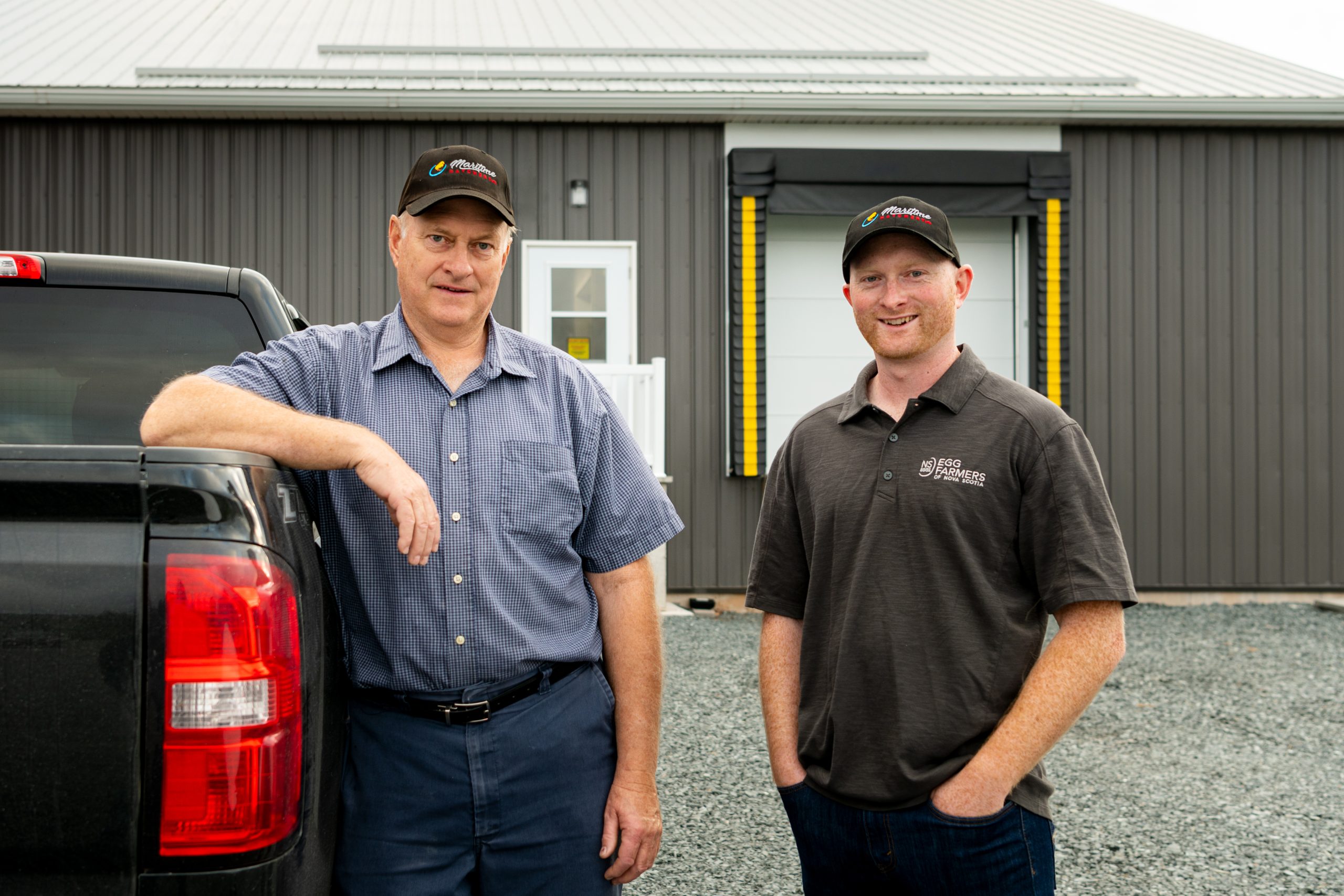
Name: Ross Cox and son; Cory
Farm: Ross Cox Poultry Farm
Location: Maitland, Nova Scotia
Farming Since: 1950; 3rd Generation
Other: Pullets
Ross Cox owns Ross Cox Poultry Farm, but his son Cory is working to take over the farm. Cory has completed the Young Farmers program through EFC and is working hard to learn all he can from his father.
One of 25 registered egg farms in the province, Ross Cox Poultry Farm, is located in Maitland and is home to laying hens, replacement pullets and a hatchery. The farm also employs roughly 15 people in both full and part-time year-round positions.
“Our farm is vertically integrated,” Cory explains. “This means that we’re directly involved in many steps of the process of getting the eggs from the farm to your table.” First, Cox Brothers Poultry Farm hatches the chicks they raise through the pullet (adolescent) stage. Then, when the pullets reach 19 weeks of age, they are moved to a separate barn, where they begin to lay eggs.
As the eggs are laid by the hens, they are gathered and stored in refrigerated rooms until they are ready to be shipped. The eggs are loaded onto refrigerated trucks by Cory and other farm employees and are shipped to the grading station. At the grading station, the eggs will be cleaned, graded, packaged and sent to Nova Scotia stores.
“It typically takes only 4-7 days for the eggs to get from the farm to the stores,” Cory explains. “Our eggs go to Maritime Pride Eggs grading station to be cleaned, graded and packaged. As a result, the eggs are still extremely fresh when they get to the store shelves, something that consumers truly value.”
Ross Cox Poultry Farm also has an on-farm feed mill that allows them to produce their own mix of feed rations to match the requirements of the hens. “We basically do everything except grow our own crops and grade our own eggs,” Cory says. “A big advantage to this is that we have control at all levels of production.”
For Cory, being an egg farmer is a rewarding job. He is proud of his role in supplying thousands of consumers with a delicious and healthy product. Part of what makes Cory so successful is the pride he takes in his work. As for his career choice, returning to work on the family farm was one of the best decisions he has ever made.
“Being able to produce a high quality, local product for people to enjoy- that’s something I’m really proud to do.”
Young farmers are the future of egg farming. So, representing my province is important to me and an extremely rewarding role.
Most provinces have at least one participating young farmer, but Nova Scotia has four! For a relatively small province, it is incredible to have four.
I completed several learning modules presented by Egg Farmers of Canada. The modules included components like public speaking, on-farm programs, strategic planning, trade and marketing. It’s important to understand what is happening in the industry to deal with whatever issues or opportunities come next!
The program gave me the opportunity to network with other young farmers from diverse farming backgrounds across the country under the theme ‘farm together’. It allowed me to talk with other farmers and by participating in the program I was able to compare production practices, technology and business management techniques from across Canada. I was able to bring all the information I learned back home to my family’s farm and use it to help create improvements on the farm.
I have! Growing up, I have always had an interest in the farm. I remember going to the barn with my dad to check on chicks. As I grew older, I was given more responsibility and I started looking after them myself. I would be responsible for feeding and watering them. As I continued to grow, I would work on the farm in the summer and on the weekends. When I started university, I would still come home on weekends to help.
I went to Dalhousie University Faculty of Agriculture in Truro, NS. I graduated in May 2015 with a Bachelor of Science in Agriculture. I majored in agriculture business and have a minor in animal science and agriculture economics. I learned a lot of different skills at university that have been useful when working and operating the farm. Just knowing how to look at situations in different ways to solve problems is something that I can apply to my work.